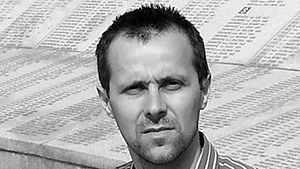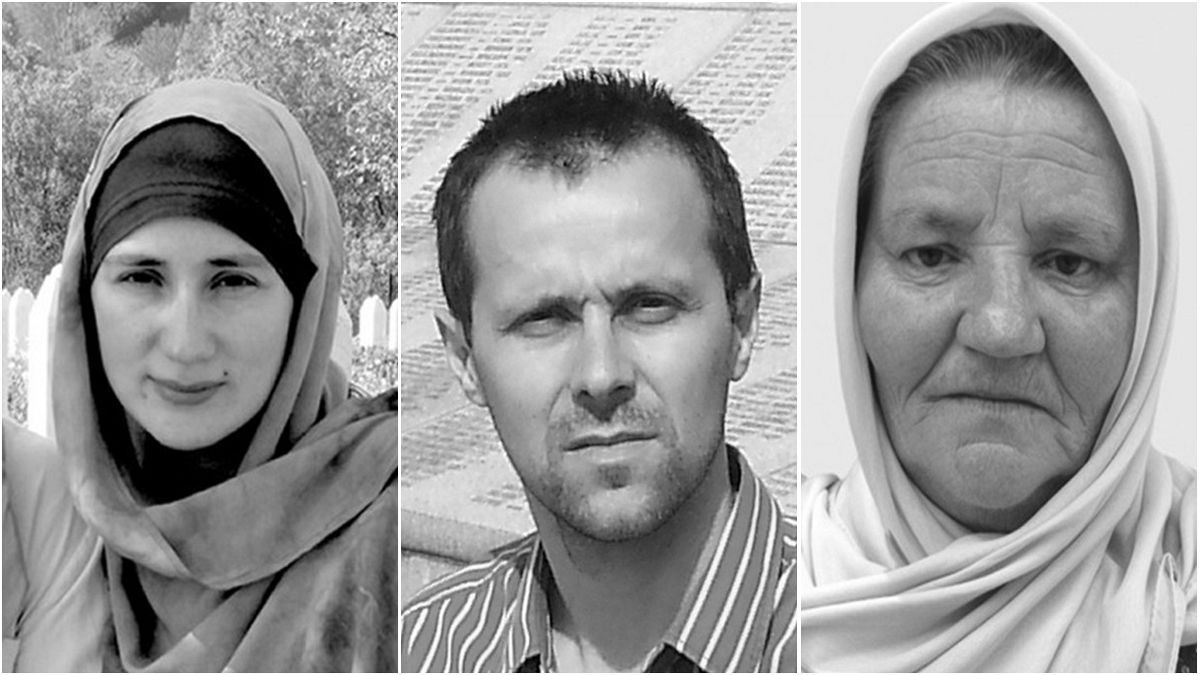It was the worst mass killing on European soil since World War II – the massacre of 8,000 Muslim men and boys in Srebrenica.
The UN war crimes tribunal for the former Yugoslavia says the slaughter was genocide.
It began on July 11, 1995, towards the end of Bosnia’s 1992-95 war, which started following the break-up of Yugoslavia.
The massacre happened despite the presence of the UN, who created ‘safe havens’ for civilians in Srebrenica, Sarajevo and Gorazde.
To mark the 20th anniversary of the massacre, we have brought together the stories of some of those most touched by the tragedy.
 Nedžad Advić
Nedžad Advić
Nedžad Advić – the teenager who survived a mass execution
Nedžad Advić was 17 when the massacre took place. Three years earlier, he says, his family had been forced out of their home after it was torched by Serb soldiers.
He took shelter with his father, mother and three younger sisters in Srebrenica in 1993. He said the arrival of the UN had given them hope but that was dashed, when, in July 1995, General Ratko Mladic began an offensive in the region.
“I thought that I would die fast without suffering. Thinking that my mum would never know where I finished they began to shoot us in our backs. I did not know whether I lost consciousness, but I lay on my stomach bleeding and trembling. I was shot in my stomach and right arm. The shooting continued and I watched the lines of people falling down.
“I could hear and feel bullets hitting all around me. Shortly after that I was wounded heavily in my left foot. The men were dying around me; I could hear their death-rattles.
“I was dying too in terrible pain and had no strength to call them to kill me. I said to myself: ‘Oh my God, why don’t I die?’ The pain was unbearable.
It was midnight and the lorry moved away. Trying to raise my head I noticed a man who was moving. I asked him: ‘Are you alive?’ He answered: ‘Yes, come to untie me.’ We succeeded in untying one another and avoiding the next lorry arriving.
After days of suffering, wandering through the woods, hiding in the streams, sleeping in the graveyards, crawling with my terrible pain we managed to reach the territory under Bosnian government control. My father, uncle and relatives who sought shelter at the Dutch base in Potočari did not survive.”
 Saliha Osmanović
Saliha Osmanović
Saliha Osmanović – the mother who lost her whole family
“On 11th July 1995, my world changed forever. Five days earlier, on 6th July I had buried my youngest son, Edin. He was killed by a Bosnian Serb grenade, as their forces advanced on the UN Safe Area of Srebrenica.
“When I buried Edin on that hot summer’s day, I imagined things could not get any worse. But less than a week later, I lost the rest of my family; my husband, Ramo, and son, Nermin, were captured and killed as they fled to the free territory of Tuzla. I, along with thousands of other women, waited at a refugee camp for my husband and son to arrive. They never did.
“After my village was attacked and burnt down by Bosnian Serb forces in May of 1993, we fled to the UN safe haven, certain the world would protect us. The conditions were abysmal. We lived in a house with 60 people, without electricity or running water, and only one toilet.
“On the night of July 11th, I heard the screams and cries of people who were being tortured and killed. All the refugees were paralysed with fear. The next morning, trucks arrived to take us to free territory. Later, I watched in horror at what had become of our men and boys. Video footage taken by Bosnian Serb forces emerged of my husband being captured with several others. He was calling up to Nermin, who was hiding in the mountains, to surrender. I cannot describe the excruciating pain I experienced watching that.
“Ramo and Nermin were eventually found in mass graves, and I buried them in 2008 at the Potocari Memorial Centre. I finally returned to my village in 2009, and now live on my own in the house that we all once lived in happily together. There is certainly life after such suffering, but there’s never any joy.
“July 11th is always a particularly difficult day for me. It reminds me that the world was watching then, but it failed us.”
 Nirha Efendić, right
Nirha Efendić, right
Nirha Efendić – the girl whose family was cut in half
“By the time of the genocide, I was 15. As the Serbian military descended upon Srebrenica, we ran for cover to Potočari. The UN base was completely full. So we hid in a nearby factory. My father and brother fled to join the column, but they couldn’t catch up to the men who had already left. I was told that they were captured by the Serbian military in the hills surrounding Srebrenica.
“Meanwhile, my mother and I were in the empty factory with thousands of other women and children for three days. We had no food, and no water. By the fourth day, the Serbian military escorted us onto busses and trucks headed towards the free territory. The journey, which takes a maximum of one hour, took four grueling hours to complete because of the sheer magnitude of women and children that needed to be transported.
“Suffering from exhaustion and a high fever, I was completely unaware of what was happening around me. When we arrived in the free territory, I distinctly recall hearing screams coming from the river. But I never turned back to see what was happening. I just wanted to keep walking forward; away from the chaos, and away from the stench of death that hung heavily in the air. I can still hear those screams today.
“A month later, we heard about my father. He had been kept in a hangar in Kravica with several other men, and later executed. His remains were finally identified in 2002 in a mass grave in Srebrenica, and we buried him in 2004. Four years ago, we heard about my brother. They found just 25% of his mortal remains in secondary mass graves. He was killed in Zvornik, just 19 days before his 20th birthday.
“I had definitely grown up by the time the conflict was over. My family was literally cut in half; my father and brother snatched from us in the most horrific way. And yet I understood that life had to go on. My mother enrolled me at a school in Zagreb, Croatia, and she went to Germany as a refugee.
“After I finished secondary school, I returned to Bosnia with my mother. We rented a flat in Sarajevo until I graduated, and then my mother moved back to Srebrenica. I always knew that she would go back. She believes in justice, and she wanted to fight for what was and is right- fully hers — her home. So I was adamant to support her. But I chose to make a life for myself in Sarajevo. I married, had children, and attempted to continue with my life. But the war, and in particular, the genocide, continue to haunt me. That sort of experience scars you in a way that cannot be communicated in words. I go back to Srebrenica at every opportunity I get. Not only for my mother, but also for myself — as a method of finding some stillness now in memories that are seared with the chaos of bloodshed and horror.
“I pray that my three children grow up to be kind, tolerant people. I want to teach them to always to be aware of everything around them, and to be smart about the decisions they make. I want to teach them about my past, so that they can be aware of their history. But for now, I just want them to enjoy a happy, carefree childhood, where they can feel safe and protected in their own home.”
These stories are republished with permission from Remembering Srebrenica, a UK charity.
